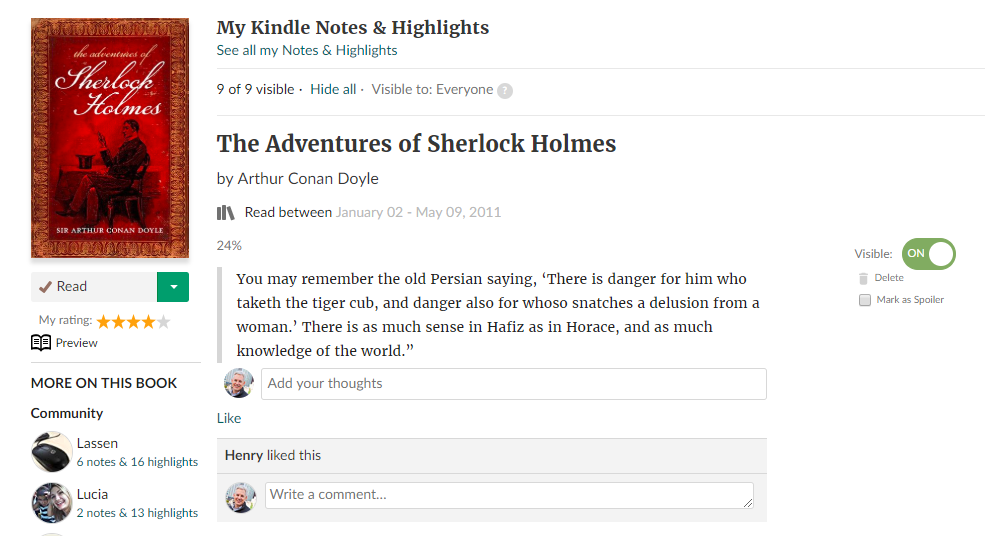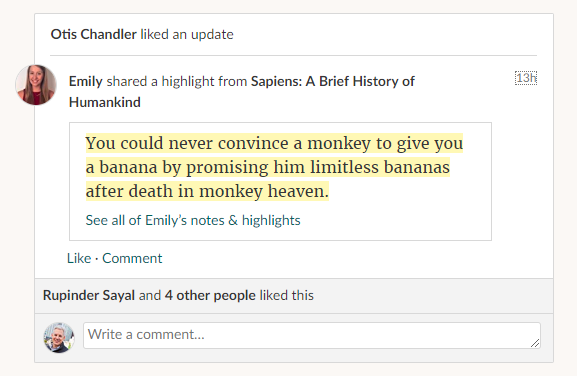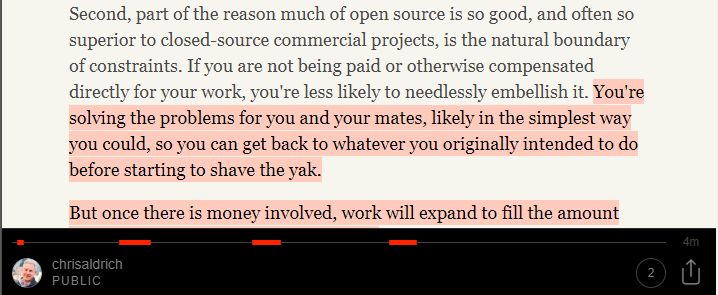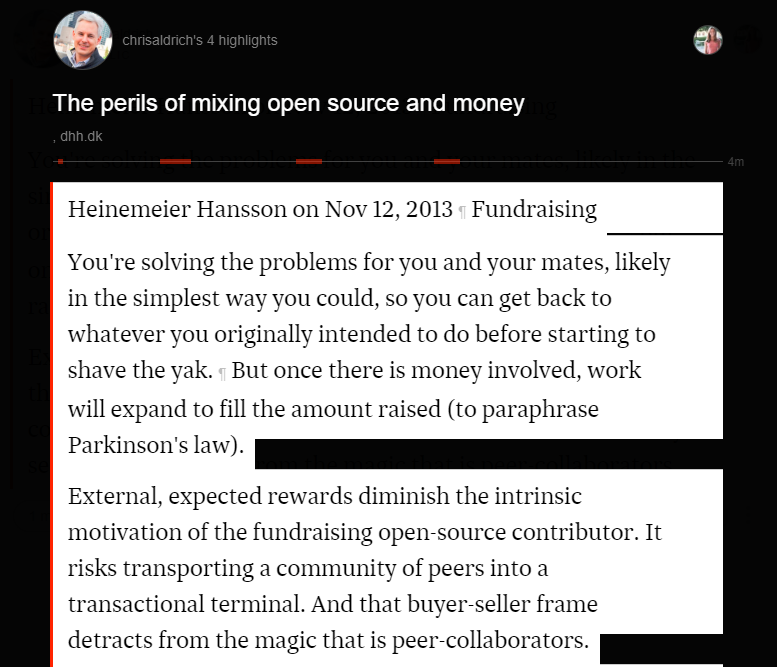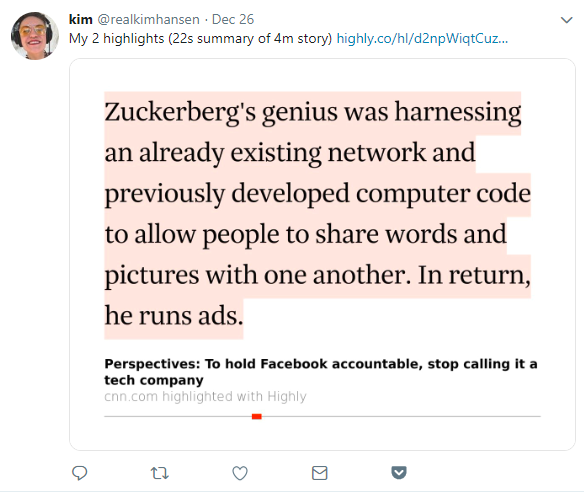highlight
This article is a stub. You can help the IndieWeb wiki by expanding it.
A highlight is a reaction post of a range of content that consists typically of just a restyling (like a yellow background as you might use a yellow physical highlighter, or an underline).
Why
People highlight books and other physical texts, as well as do so with revisions in proprietary software like Microsoft Word, thus there is some evidence they may want to do so with posts on the web as well.
How To
No specific how to post a highlight post has been determined. More real world examples are needed for study before reasoned proposals can be made / implemented that would be able to support a desired presentation.
IndieWeb Examples
Chris Aldrich
 Chris Aldrich has been experimenting with highlighting in posts since around October 2016. In some read posts, in which he also archives the original post, he uses the html <mark> tag sometimes with a class using his initials and/or a date/time stamp (when the post date/time don't otherwise agree with the original highlight time) to indicate the originator and date/time of the highlight. The color of the highlight can be easily handled in CSS and as the mark html tag is not often used, it doesn't typically conflict with the uses via other sites.
Chris Aldrich has been experimenting with highlighting in posts since around October 2016. In some read posts, in which he also archives the original post, he uses the html <mark> tag sometimes with a class using his initials and/or a date/time stamp (when the post date/time don't otherwise agree with the original highlight time) to indicate the originator and date/time of the highlight. The color of the highlight can be easily handled in CSS and as the mark html tag is not often used, it doesn't typically conflict with the uses via other sites.
Because of the way his read posts are created, the matching of the original canonical URL allows other highlighting/annotation layers, like Hypothes.is for example, to also add their highlights and annotations over his pages as well. See note at Pressforward and Hypothesis Work Great Together. In some sense this gives him the ability to recreate the functionality of turning on/off the highlights of others, a functionality offered by Amazon Kindle (see section on https://www.amazon.com/gp/help/customer/display.html?nodeId=201241990 View Popular Highlights & Public Notes].
He's considering using a microformat (perhaps `p-highlight-of`) on highlights for parsers to be able to find/consume them in the future to differentiate between other similar mark up including `u-quotation-of` and `h-cite`.
In book reviews since Summer 2016, he has also been adding blockquotes containing highlighted text exported from his Amazon Kindle indicating a particular highlighter color which he also uses to delineate particular meanings. Example: Guide to Highlight Colors.
Another older example of a highlight on his site is Continuum functional integrals. This was created as a quotation at the time (given the technology), but the original intent was to highlight the particular quote with a much longer textbook. Instead of including simply a quotation, he included a photograph of the portion of the text in the post along with a blockquoted copy he meant to highlight.
2018-06-22 As an experiment, I created an explicit highlight post type on my website using some custom code in conjunction with Post Kinds Plugin which gives me a specific archive of highlights as well as a subscribe-able highlight feed. Links for highlights are marked up with an experimental u-highlight-of microformat.
Kartik Prabhu
 Kartik Prabhu uses a version of bookmark + fragmention to effectuate highlights on his site. Example: https://kartikprabhu.com/notes/2016-12#bm-resilientweb-choose-tools-wisely
Kartik Prabhu uses a version of bookmark + fragmention to effectuate highlights on his site. Example: https://kartikprabhu.com/notes/2016-12#bm-resilientweb-choose-tools-wisely
Silo Examples
Hypothesis
Hypothes.is is an annotations-based silo that allows one to both highlight and add notes/marginalia onto an overlapping layer on pages. These notes have permalink URLs and they can also be shared to other sites.
UI example of Hypothesis highlight feed with a particular highlight chosen with an expanded view of it and it's data. Permalinks for individual highlights are quite similar, but display less data.
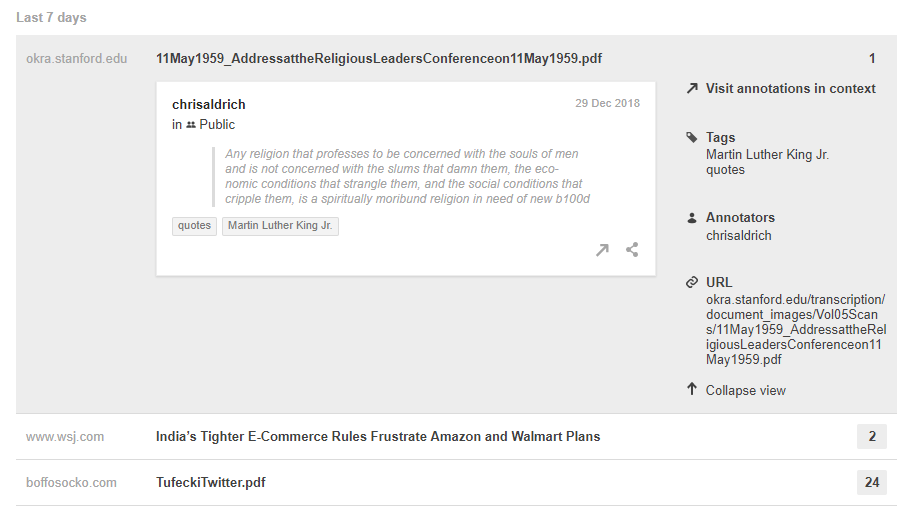
UI example of a highlight on a .pdf file with tags in situ:

Medium
Medium may have features resembling highlighting.
Kindle
Most Amazon Kindles have a file named myclippings.txt on their drives which is a simple text file that stores all the annotations made on that device.
Amazon provides an online interface at https://read.amazon.com/notebook for finding and managing highlights and annotations on Kindle devices and apps.
There are a few tools and applications for trying to export highlights and annotations from the Amazon Kindle platform, which include:
Readwise.io
Readwise is a paid service that helps to:
- Sync your highlights from Kindle, Instapaper, or iBooks
- Review the best parts easily through a daily email & app (using spaced repetition)
Bookcision
Bookcision is a Javascript bookmarklet that will yield a single page of cleanly styled highlights, which can then be copied to one's clipboard and pasted into a local text repository (one's website, wiki, or services like OneNote, Evernote, DevonThink, etc.) Chrome users will additionally be offered the ability to download the highlights in plain text, JSON, or XML formats.
Bookcision is maintained by Readwise. Issues with it can be filed at Github, with a detailed bug report for help.
Clippings.io
Clippings.io is a multi-platform app for extracting your highlights and annotations from the Amazon Kindle platform. It helps you to:
- Edit and annotate your Kindle highlights and notes
- Search your Kindle highlights online
- Export your Kindle highlights to Word, Excel and PDF
- Save your Kindle highlights to Evernote
- Browse your Kindle highlights online
- Import your Kindle highlights from any device or your own website
Calibre
Calibre has an experimental feature for extracting highlights and annotations out of Kindles as well: https://jetshred.com/2012/07/26/how-to-backup-and-view-kindle-highlights/
 Kevin Marks has highlighted text within Twitter using photos of actual texts. This relatively frequently used functionality (though often using screenshots) is commonly used to get around the 140 character limit found on Twitter.
Kevin Marks has highlighted text within Twitter using photos of actual texts. This relatively frequently used functionality (though often using screenshots) is commonly used to get around the 140 character limit found on Twitter.
GoodReads
Goodreads in conjunction with its corporate parent Amazon allows one to sync their highlights and annotations (or notes) from e-books on the Amazon Kindle family of devices to their GoodReads account. UI features and data for archives of books include the title and author, cover image, the text of the highlight, and the abilities to annotate or comment and like the highlight, to make the highlight public or private, to delete it, and to mark it as a spoiler.
When made, highlights will show up in one's user feed for others to comment or like them. Here is an example of a highlight within a feed:
Highly.co
Highly was a silo web app that allowed users to highlight content on web pages and within apps. Highlights on the service are cloud-synced, searchable, and shareable. On 2019-04-17 Highly announced on Medium that they would be joining Twitter. Though they indicate that their service will change somewhat and remain "up", it might be a good idea to export your data.
UI example of a highlight in situ. The service overlays a text "timeline" and visually indicates the percentage amount of text as well as it's relative location in the piece along with an estimated reading time for the entire text.
UI example of highlights within the silo which also indicate other users who have highlighted the same content.
UI example of a highlight shared from Highly to Twitter. This can obviously be used to get around the character limits for posting to Twitter.
Other Examples
Photos of Highlighted Text
Needs more research, documentation, screenshots.
Brainstorming
bookmark a fragmention
At a minimum, a highlight post could be represented by a bookmark of a fragmention.
The receiver of the highlight reaction, could determine this automatically, and decide to provide highlighting with a default highlight color that goes well with their post styling.
Alternatively, since highlights of paper text typical consist of the person doing the highlighting making a deliberate choice of how to stylistically express the highlighting, that stylistic expression could be considered as an additional attribute / property of a highlight post.
See Also
- bookmark
- fragmention
- interactions
- posts
- reactions
- annotation
- https://crc.io/blog/2016/01/highlighting-the-internet-part-2/ – blog post describing import of highlights from Medium, Hypothes.is and Kindle.
- https://twitter.com/readwiseio/status/1291486018634383360
- "🆕 in Readwise: better OCR highlighting of paper books!
1️⃣ We've improved our text parsing algorithm a lot, meaning fewer typos and less time tweaking passages🤓
2️⃣ You can now make a highlight across multiple pages (see below👇)" @readwiseio August 6, 2020
- "🆕 in Readwise: better OCR highlighting of paper books!
- Example of post with book highlights that's also an article at the same time: Badass: Making Users Awesome by Kathy Sierra by Joel Hooks
- UI example of an article headline that uses CSS to animate the highlighting of lines within the text: https://www.houstonchronicle.com/projects/2022/roe-opinion-annotated/

